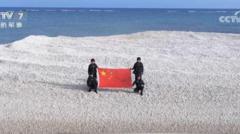In a significant escalation of territorial disputes in the South China Sea, the Chinese coastguard has reportedly asserted control over Sandy Cay, a small sandbank in the Spratly Islands. State media, including CCTV, shared images of officers standing on the contested reef, emblazoned with the Chinese flag, while declaring that China has "implemented maritime control and exercised sovereign jurisdiction" over the area.
The Philippine government has yet to officially respond to this development, although both nations have long-standing claims to various islands and maritime zones in these contested waters. Tensions have surged recently, culminating in incidents involving vessel collisions and confrontations between the two nations. Sandy Cay's proximity to the Philippine military outpost on Thitu Island adds another layer of complexity, as Manila utilizes this location to monitor Chinese activities in the sector.
While initial reports suggest that China has not established a permanent presence on the 200 square meter island, the move has drawn the attention of the U.S. government. James Hewitt, spokesperson for the National Security Council, described these actions as "deeply concerning if true," asserting that they pose threats to regional stability and contravene international law. The U.S. is reportedly engaging in consultations with allies in response to the situation.
The coastguard's actions come amidst annual military exercises known as the Balikatan drills, involving around 17,000 troops from U.S. and Philippine forces, taking place in the Philippines. The exercises have drawn criticism from China, which views them as provocations. Military officials from the Philippines emphasize that these drills are designed to bolster national defense and are not aimed at any specific nation.
Long a source of contention among various Southeast Asian nations, the South China Sea's territorial disputes reflect deeply rooted historical grievances that have intensified in recent years. China's aggressive claim, marked by the "nine-dash line" which extends hundreds of miles from Hainan province, underscores its ambition to assert dominance over this strategically vital region. Competing claims from neighboring countries, including Vietnam, Taiwan, Malaysia, and Brunei, only deepen the complexity of this geopolitical flashpoint.




















